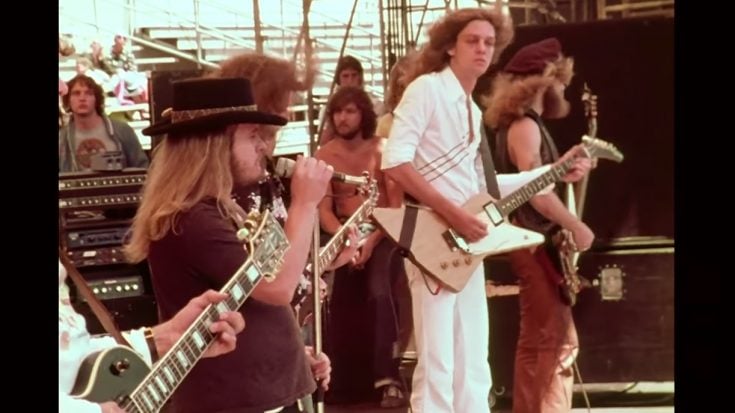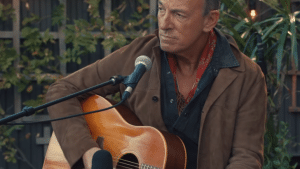10 Musicians Who Predicted The Future

Lynyrd Skynyrd - Freebird - 7/2/1977 - Oakland Coliseum Stadium - Youtube
Have you ever listened to a song and felt a shiver down your spine because the lyrics seemed eerily relevant to current events, even though the song was written decades ago?
Music often reflects the times, capturing the anxieties and aspirations of a generation. But some musicians seem to go a step further, crafting lyrics that feel strangely prophetic. In this list, we’ll be diving into the work of ten musical artists whose work appears to have predicted the future.
We’ll explore how Rage Against the Machine’s fiery anthems mirrored the rise of an infamous president, and how John Lennon’s chilling visions of a shooting death So join us as we explore these uncanny musical prophecies and the artists who delivered them.
10. Lynyrd Skynyrd – Fiery Plane Disaster
Lynyrd Skynyrd, a powerhouse in the ’70s southern rock scene, met a tragic fate just days after releasing their fifth album. The band’s signature lineup was shattered when a plane crash in Mississippi claimed the lives of seven people, including three band members.
The impact of this devastating event reverberated through their art, prompting them to alter the cover art for their newly minted album, Street Survivor. The original artwork, depicting the band engulfed in flames, eerily mirrored the real-life catastrophe.
“That Smell”, one of the album’s standout tracks, digs into themes of impending death. The lyrics took on a haunting significance, given the band’s recent loss. Survivors later revealed that lead singer Ronnie Van Zant had an unsettling premonition: he believed he wouldn’t live past the age of 29.
Tragically, his intuition proved accurate when he perished in the ill-fated flight, forever linking his fate to the band’s prophetic music. The eerie coincidences surrounding Lynyrd Skynyrd’s plane disaster continue to captivate audiences, underscoring the power of art to foreshadow life’s most tragic moments.
9. Teodoro & Sampaio – Fire at a Nightclub
Teodoro & Sampaio, the Brazilian country duo renowned for their humorously vivid lyrics, took an unexpected turn into darkness with their 2008 song, “Pegou Fogo Na Zona”. Initially perceived as a rhetorical exploration, this ballad delved into the harrowing scenario of a nightclub fire that claimed numerous lives, including that of the band’s own accordionist.
Fast forward five years, and reality eerily mirrored their lyrical prophecy. Another group, Gurizada Fandangueira, found themselves performing at a nightclub in Santa Maria, Brazil, when disaster struck—a fire broke out. Among the hundreds who tragically lost their lives was none other than Gurizada Fandangueira’s accordionist, Danilo Jaques.
Fans of Brazilian country music couldn’t help but draw chilling parallels between this real-life catastrophe and the prophetic verses penned by Teodoro & Sampaio.
The haunting lyrics of “Pegou Fogo Na Zona” lingered, serving as a poignant reminder of the power of music to foreshadow life’s most devastating events. In this tragic intersection of art and reality, the duo unwittingly etched their place in the annals of musical foresight.
8. Rage Against the Machine – Donald Trump Becoming President
The band Rage Against the Machine has always been known for their critical view of American politics and capitalism. Their music video for “Sleep Now in the Fire”, released in 1999, turned out to be eerily prescient. It depicted a scene set in the year 2000, where an actor on Wall Street held up a campaign sign for Donald Trump, suggesting his run for presidency.
In an unexpected twist of reality mirroring art, the very next year after the video’s release, Trump made his first bid for the presidency. Fast forward to 2016, and the once far-fetched idea became reality when he was elected as President. This turn of events was so accurately foreshadowed in the music video that it left many astounded by the band’s foresight.
The creation of the prophetic sign in the video is attributed to director Michael Moore, as revealed by the band’s bassist, Tim Commerford. Moore, a well-known documentarian, had even hinted to the band in 2016 about the plausibility of Trump’s presidency before it came to pass, further cementing the band’s reputation for their predictive themes in music.
7. Nicki Minaj – Death of Her Cousin
Nicki Minaj, a renowned rapper, has faced numerous challenges in her life, but none as publicly mourned as the loss of her cousin in July 2011. His untimely death cast a shadow of sorrow that was reflected in Minaj’s art. Remarkably, a song titled “We Miss You” surfaced online just two days following his passing, with lyrics that hauntingly mirrored the circumstances of his demise.
The song, which was penned a year before the tragic event, was initially intended as a fictional tribute to a departed lover. However, the narrative bore an uncanny resemblance to her cousin’s fate, blurring the lines between art and reality. This coincidence left fans and listeners in awe of the song’s prophetic nature.
Minaj would later channel her grief into her music more directly, creating heartfelt homages in tracks like “Champion” and “All Things Go”. These songs served as a testament to her cousin’s memory, and the lyrics of “We Miss You” remain a poignant prelude to a real-life tragedy, showcasing the power of music to echo life’s most profound moments.
6. Zapp – Online Dating
Zapp, the electro-funk ensemble, was known for their futuristic vision, particularly in the realm of romance. Their 1986 hit “Computer Love” was a trailblazer, painting a picture of love in the age of technology. The song anticipated the rise of digital dating long before it became a societal norm, suggesting that finding love through a computer screen could be the next big thing in romance.
As the 1980s progressed, the concept of online dating evolved from a mere idea to a reality with the launch of Match.com in 1995. This marked the beginning of a revolution in the dating world, as the internet became a new and accepted medium for seeking romantic connections. Zapp’s early endorsement of this trend through their music underscored the potential of technology to transform personal relationships.
Charlie Wilson, the voice behind the band, later reflected on the song’s avant-garde theme and its initial reception. “Computer Love” was considered so ahead of its time that it nearly didn’t see the light of day. Despite the record label’s hesitations, the song was released and went on to validate the concept of online dating, granting it a stamp of approval that predated the industry’s boom. Zapp’s foresight in recognizing the role of technology in romance is a testament to their innovative spirit and influence on future trends.
5. The Game – Barack Obama Hunting Down Osama bin Laden
The Game, a rapper known for his unwavering admiration for Barack Obama, took his fandom to the next level by getting a tattoo of the President in 2013. But it was in 2007, shortly after Obama announced his candidacy, that The Game delivered a striking endorsement through his collaboration with Lil Wayne in the track “Hard Times.” The lyrics boldly hyped Obama’s capabilities, suggesting he could catch the elusive Osama.
Fast forward to 2011, and the world witnessed a pivotal moment: Obama oversaw the operation that ultimately led to the death of Osama bin Laden. The prophetic nature of “Hard Times” became apparent, as it had unwittingly predicted both a historic presidency and the demise of an Al-Qaeda leader.
The convergence of art and reality in this instance remains surprising and thought-provoking, showcasing the power of music to echo significant events.
4. John Lennon – Shooting
In 1984, the public was introduced to “Borrowed Time,” a plucky ballad that grappled with the inevitability of death. Little did they know that this would be one of the last songs John Lennon recorded before his tragic assassination by Mark David Chapman in 1980. However, Lennon’s eerie premonitions extended beyond the lyrics of this haunting track.
As far back as 1965, Lennon had publicly speculated about his own demise. He candidly told a reporter that The Beatles might meet their end through a plane crash or by being “popped off by some loony.” The artist’s foresight took on an even more chilling dimension when fans connected dots: the song title “Happiness Is a Warm Gun” and the whispered plea “shoot me” during “Come Together.” These cryptic moments seemed to foreshadow the tragic fate that awaited him.
In the intersection of art and reality, John Lennon unwittingly etched his own destiny into the annals of music history. His ability to hint at his impending end through song lyrics remains both haunting and awe-inspiring, a testament to the power of creativity to transcend time and space.
3. Jimi Hendrix – Death & Climate Change
Jimi Hendrix, the enigmatic musician known for his edgy songwriting, left behind two haunting tracks that seemed to foreshadow both his own fate and a global crisis. The first, “The Ballad of Jimi,” concluded with a chilling chant: he would be dead within five years. Hendrix himself had long harbored a premonition that he wouldn’t see his 30th birthday. Just two days before his untimely passing at the age of 27, he cryptically told a journalist, “I’m almost gone.” The eerie twist? He did indeed die exactly five years after completing “The Ballad of Jimi.”
But Hendrix’s prophetic musings didn’t end there. In his 1967 song “Up From the Skies,” he made an alarming observation. The lyrics referred to a scorched world as “a change of climate.” At the time, the science behind climate change was relatively unknown, and the term itself wouldn’t gain widespread recognition until the 1980s. Yet here was Hendrix, weaving it into his music—a subtle warning that resonates across decades.
In the intersection of art and reality, Jimi Hendrix’s words continue to echo. His ability to touch upon personal mortality and global shifts underscores the timeless power of music to transcend boundaries and illuminate our shared human experience
2. Wilco – 9/11 Disaster
Wilco, with a devoted fanbase in the early 2000s, catapulted into mainstream recognition with their fourth album, but the circumstances were far from auspicious. Following a record label fallout, their album Yankee Hotel Foxtrot was released on the band’s website just one week after its originally planned date: September 11, 2001. What unfolded next left listeners stunned—the album eerily mirrored the tragic events of that fateful day.
Within the album’s lyrics, themes of nationalism, war, and collapsing skyscrapers emerged, resonating with the real-life chaos that unfolded on 9/11. The album cover itself featured Chicago’s iconic twin Marina Towers, further cementing the uncanny parallels. Even the title, borrowed from the NATO phonetic alphabet for air traffic control, seemed to hint at something beyond mere coincidence. Despite the unsettling predictions embedded in the record, Yankee Hotel Foxtrot garnered widespread acclaim, thrusting Wilco into the spotlight.
In this intersection of art and history, Wilco unwittingly etched their place as musical seers. The album’s ability to capture the zeitgeist of a nation in turmoil remains both haunting and remarkable. Music, it seems, can transcend time and space, echoing the pulse of our collective consciousness.
1. Radiohead – Big Tech
Radiohead, the iconic band known for their genre-defying music, has consistently demonstrated a knack for foresight. From generic pop tunes to climate commentary, their observations often transcend their time. But it’s their legendary album OK Computer that stands out, offering unique predictions about consumer technology that, in hindsight, weren’t as radical as they seemed.
In the track “Fitter Happier,” Radiohead envisioned a future where watches not only monitored health but also provided endless entertainment, effectively doing the thinking for us. Fast forward to today, and smart devices like the Apple Watch have become ubiquitous in modern society, validating the band’s eerily accurate vision. Meanwhile, on the B-side of the album, the track “Palo Alto” anticipated Silicon Valley’s tech boom—a prescient nod to the rise of giants like Google, which would move in just three years later.
Within this album lies a tapestry of abstract warnings about social regression amidst technological progress. Radiohead’s cautionary lyrics serve as a reminder that the boundary between art and reality is porous, and their track record of foresight suggests that what sounds strange today may well become our everyday reality tomorrow.





















